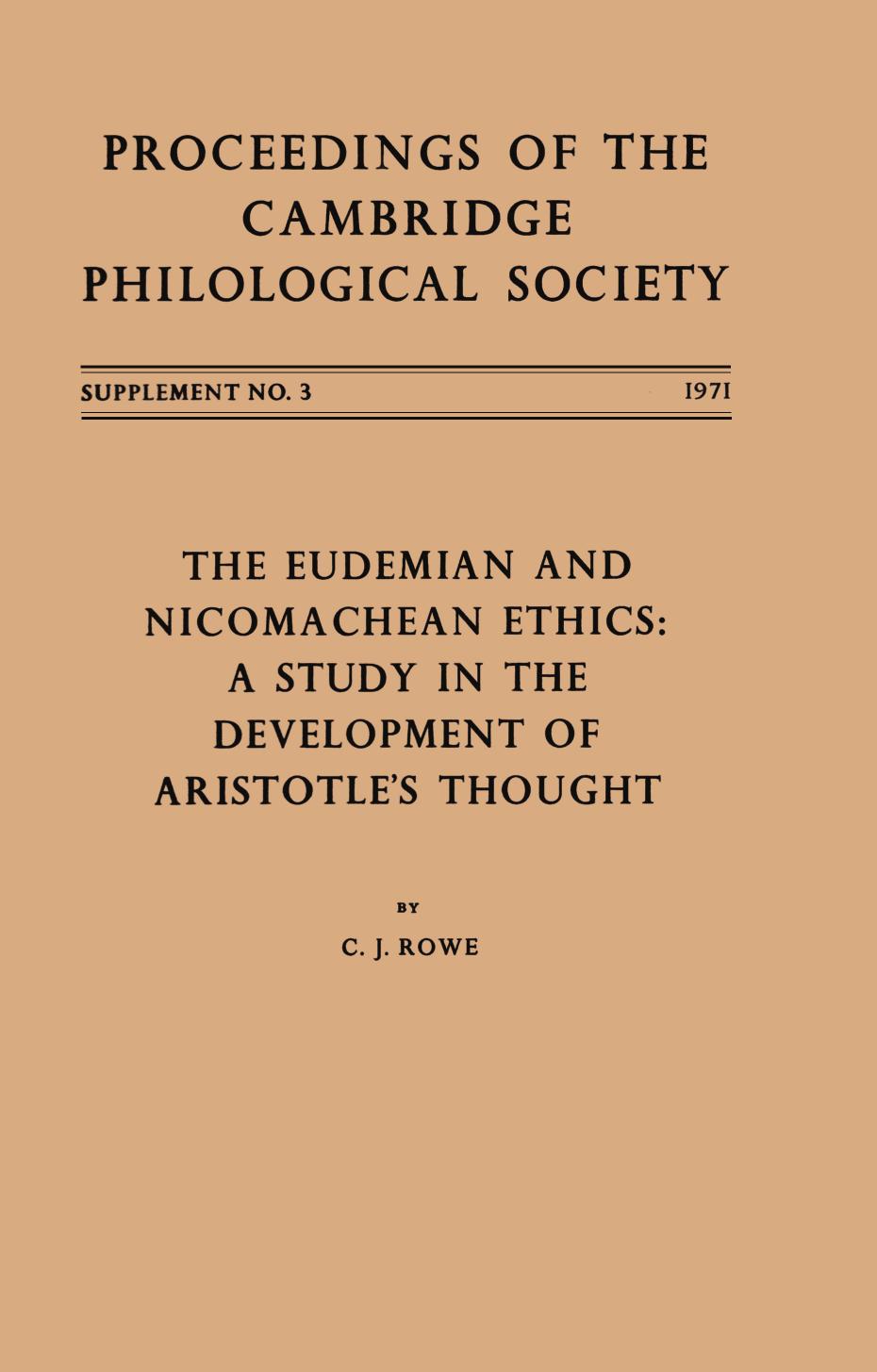The Eudemian and Nicomachean Ethics by C.J. Rowe;

Author:C.J. Rowe;
Language: eng
Format: epub, pdf
Tags: -
Publisher: Casemate Publishers & Book Distributors, LLC
1 A version of this chapter was presented as a paper at the Fifth Symposium Aristotelicum, held at Oosterbeek, Holland in August 1969, and has been published in the volume of Proceedings (Untersuchungen zur EE, ed. P. Moraux and D. Harlfinger, Berlin 1971).
2 There are exceptions (at 1096 b 24, 1098 b 24, 1153 a 21 and 1172 b 30). But in all these places Aristotle is explicitly discussing the views of others; and in VI he quite plainly distinguishes such uses of the term from his own.
3 EN 1139 a 8â10.
1 Op. cit., English translation, p. 239.
2 See p. 11 above. I shall later suggest, however, that it is a great deal closer to the truth than his critics have allowed.
3 I.e. at 1215 b 2, and 1216 a 11 ff.
4 It may in fact be used in more than two senses; at 1247 a 15 ff., for instance, the word tends to shade into the totally unphilosophical and ordinary meaning of âgood senseâ. But there is no real tension between this and the other senses, and I have therefore ignored it.
5 Op. cit.
6 F. Wehrli, âEthik und Medizin. Zur Vorgeschichte der arist. Mesonlehreâ, Mus. Helv. 8, 1951, p. 38, n. 11.
7 R. A. Gauthier, J. Y. Jolif, LâEthique à Nicomaque, Louvain 1958, 1, p. 28*.
8 1216 a 37 ff., 1218 b 34â5.
9 I.e. ÏοÏία in the strict technical sense of EN, âcontemplative wisdomâ.
10 Op. cit. p. 109.
1 See Part III, chapter 1.
2 I.e. the Platonic sense, and âpractical wisdomâ in the sense of EN.
3 It is perhaps misleading to call this the âPlatonicâ use, as I have so far done, since there is no suggestion that ÏÏόνηÏÎ¹Ï in this sense has anything to do with practical action, as the Platonic ÏÏόνηÏÎ¹Ï undoubtedly has. It is much more like a simple equivalent of ÏοÏίαâas, indeed, my criticism of Léonard implied.
4 See pp. 18â19 above.
5 Dirlmeier compares Pol. 1325 b 16â21. See also EN 1098 a 3, 14.
6 In EN, Aristotle takes care to avoid confusion by pairing ÏÏá¾¶Î¾Î¹Ï explicitly with á¼Î½á½³Ïγεια.
1 1216 b 3â25.
2 P. 19.
3 I.e. in Part 1.
4 Cp. 1215 a 8â25, where it was suggested that happiness depended on a man and his actions being of a certain character (ÏÎ¿Î¹á½¹Ï ÏιÏ).
5 I.e. as he has done consistently throughout the preceding chapters, along with virtue and pleasure (the omission of any mention of pleasure from the programme here of course presents no problems, since discussion of it has already explicitly been deferred in the last few words).
1 I.e. at 1096 b 24, and 1098 b 24.
2 I.e. at 1097 b 2, where the list of examples is clearly intended to pick up that in the previous chapter (though Î½Î¿á¿¦Ï already appears there, at 1096 b 29).
3 Note also that at 1220 a 5 ff. EE gives ÏοÏία and ÏύνεÏÎ¹Ï (and δεινόÏηÏ) as examples of intellectual á¼ÏεÏαί; in the corresponding passage in EN (1103 a 3 ff.) we find ÏοÏία, ÏύνεÏÎ¹Ï and ÏÏόνηÏιÏ. Even in this very general passage, I suggest, Aristotle is preparing for his later discussion.
Download
The Eudemian and Nicomachean Ethics by C.J. Rowe;.pdf
This site does not store any files on its server. We only index and link to content provided by other sites. Please contact the content providers to delete copyright contents if any and email us, we'll remove relevant links or contents immediately.
The Daily Stoic by Holiday Ryan & Hanselman Stephen(3292)
The Fate of Rome: Climate, Disease, and the End of an Empire (The Princeton History of the Ancient World) by Kyle Harper(3051)
People of the Earth: An Introduction to World Prehistory by Dr. Brian Fagan & Nadia Durrani(2720)
Babylon's Ark by Lawrence Anthony(2666)
Ancient Worlds by Michael Scott(2665)
The Daily Stoic by Ryan Holiday & Stephen Hanselman(2563)
Foreign Devils on the Silk Road: The Search for the Lost Treasures of Central Asia by Peter Hopkirk(2453)
India's Ancient Past by R.S. Sharma(2441)
MOSES THE EGYPTIAN by Jan Assmann(2410)
The Complete Dead Sea Scrolls in English (7th Edition) (Penguin Classics) by Geza Vermes(2269)
The Earth Chronicles Handbook by Zecharia Sitchin(2215)
Lost Technologies of Ancient Egypt by Christopher Dunn(2211)
24 Hours in Ancient Rome by Philip Matyszak(2072)
Alexander the Great by Philip Freeman(2059)
Aztec by Gary Jennings(2017)
The Nine Waves of Creation by Carl Johan Calleman(1905)
Curse Tablets and Binding Spells from the Ancient World by Gager John G.;(1857)
Before Atlantis by Frank Joseph(1845)
Earthmare: The Lost Book of Wars by Cergat(1815)
